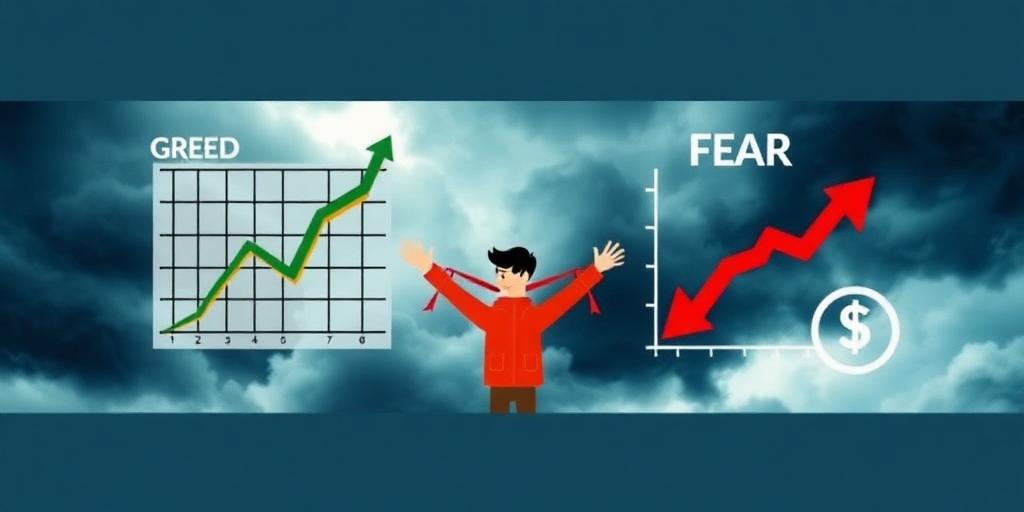Investing can be a rational endeavor, driven by careful analysis and strategic planning. However, emotions can often cloud judgment, leading to decisions that investors later regret. Recognizing the signs of emotionally driven investment choices is crucial for protecting your portfolio. This article outlines tell-tale indicators that your emotions might be leading you down a risky path.
1. Acting on Fear and Greed
Fear and greed are powerful emotions that can significantly influence investment decisions. Fear often manifests as panic selling during market downturns, while greed can drive investors to chase high returns in speculative assets without proper due diligence.
Example:
- Selling all your stocks during a market correction out of fear, only to miss the subsequent rebound.
- Investing heavily in a trending cryptocurrency solely based on hype and the fear of missing out (FOMO).
2. Ignoring Your Investment Strategy
A well-defined investment strategy acts as a roadmap, guiding your decisions and keeping you on track toward your financial goals. Emotionally driven decisions often lead to deviating from this plan.
Example:
- Suddenly shifting from a diversified portfolio to a concentrated position in a single stock based on a tip from a friend.
- Increasing your risk exposure beyond your comfort level in an attempt to quickly recoup losses.
3. Overreacting to Market News
News headlines can trigger emotional responses, causing investors to make impulsive decisions based on short-term market fluctuations rather than long-term prospects.
Example:
- Buying a stock immediately after positive earnings news without considering the underlying financials or future growth potential.
- Selling a stock due to a negative news report, even if the long-term fundamentals of the company remain strong.
4. Seeking Confirmation Bias
Confirmation bias is the tendency to seek out information that confirms existing beliefs while ignoring contradictory evidence. This can lead to overconfidence and poor decision-making.
Example:
- Only reading articles that support your bullish outlook on a particular stock, while ignoring reports that raise concerns about its valuation.
- Dismissing expert opinions that contradict your investment thesis, even if they are based on sound analysis.
5. Letting Recent Performance Influence Decisions
Recent investment performance can significantly impact your emotional state, leading to either overconfidence after gains or despair after losses. Both can result in irrational decisions.
Example:
- Taking on more risk after a period of strong returns, believing that your winning streak will continue indefinitely.
- Avoiding certain asset classes after experiencing losses, even if they are fundamentally sound and aligned with your long-term goals.
6. Revenge Trading
Revenge trading occurs when investors attempt to make up for losses by taking on excessive risk. This emotionally charged behavior is often driven by a desire to quickly recover lost capital, leading to further losses.
Example:
- Doubling down on a losing position in the hope of recouping your losses, despite the stock showing no signs of recovery.
- Day trading volatile stocks with the sole intention of making quick profits to offset previous losses.
7. Failing to Rebalance Your Portfolio
Failing to rebalance your portfolio can be a subtle sign of emotional investing. When certain assets outperform others, investors may become emotionally attached to their winners, leading them to neglect the importance of maintaining a diversified portfolio.
Example:
- Allowing a single stock to become an outsized portion of your portfolio due to its strong performance, increasing your overall risk exposure.
- Avoiding selling any shares of a winning stock, even if it means deviating from your target asset allocation.
Conclusion
Emotional investing can lead to costly mistakes and derail your long-term financial goals. By recognizing these tell-tale signs, you can take steps to mitigate the impact of emotions on your investment decisions. Developing a well-defined investment strategy, seeking objective advice, and practicing emotional discipline are essential for navigating the market successfully and achieving your financial aspirations.









